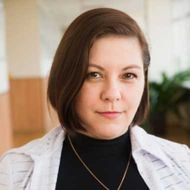HSE Launches an International Project to Study Russian as a Foreign Language

In mid-October, the HSE School of Foreign Languages held the official opening of the International Educational Online Club for Russian as a Foreign Language and Russian Culture, called GLAGOL’. The project brings together participants from 20 countries—international students and lecturers from 10 HSE faculties, as well as representatives of more than 10 Russian and foreign universities.
Russian is currently ranked fifth among the 12 most spoken languages in the world (after English, Spanish, French, and Chinese). The interest in studying Russian as a foreign language continues to grow, and the number of academic programmes in Russian at international universities is also increasing.
The online club of the HSE School of Foreign Languages offers participants an opportunity to improve their Russian communication skills while exploring the unique features of Russian culture, including its traditions and historical heritage.
To date, the project has brought together participants from 20 countries, including international students and teachers from 10 HSE faculties, as well as representatives of more than 10 Russian and international universities.

Ekaterina Kolesnikova
‘Today is a truly important event in the life of the School of Foreign Languages and HSE University,’ noted Ekaterina Kolesnikova, Head of the HSE School of Foreign Languages, Associate Professor, and Candidate of Pedagogical Sciences. ‘The concept of our international online club aims to create and strengthen ties among those interested in learning Russian, as well as to support and promote Russian culture. The club welcomes all who are interested, including international students from HSE and other universities, teachers, and partners. Even at the beginning, the project has gained popularity, with students from 10 HSE faculties expressing interest in its activities. These include not only students of the humanities but also those studying at the faculties of Mathematics, Economic Sciences, World Economy and International Affairs, Computer Science, HSE Graduate School of Business, Vishnevsky Institute of Demography, and others. We can see that the club will attract participants with different levels of Russian language proficiency and from very different age groups, ranging from 19 to 56 years old. This is wonderful, as the exchange of experience between generations is also an important and meaningful part of the project’s success.
I am sure that over time, the events of the club will become large-scale and well-known. We hope that through this club, you will see real progress in your communication skills quickly and be able to confidently use Russian in everyday conversation!’
During the academic year, participants will have the opportunity to attend open lectures given by leading experts and take part in practical conversation sessions on current and relevant topics.

Anastasia Solomonova
‘Today is a very special day for me, because we are launching a very special project. It’s a space where language is not a barrier but a bridge between different cultures, ideas, and people. Here, everyone can learn and share their experiences,’ said Anastasia Solomonova, Head of the GLAGOL’ Online Club, Head of the specialisation ‘Russian as a Foreign Language: Teaching and Promoting Russian Language and Culture’ in the Bachelor’s programme ‘Foreign Languages and Intercultural Communication’ at the HSE School of Foreign Languages, Associate Professor, and Candidate of Pedagogical Sciences. ‘I would like to emphasise that our meetings will not be like lessons or exams where someone is being graded. Instead, it is a warm and lively space for communicating in Russian, learning more about Russia and its traditions, and speaking Russian with interest and not fear. In my view, this is extremely important.’
The first lecture for the project participants was delivered by Prof. Rafael Guzmán Tirado, Doctor of Philology and Professor at the Department of Greek and Slavonic Philology at the University of Granada (Spain). In 2017, for his 30-year contribution to the preservation and promotion of Russian culture in Spain, Prof. Guzmán Tirado was awarded the Order of Friendship by Russian President Vladimir Putin.

Rafael Guzmán Tirado
‘It is a great honour for me to be speaking today at this esteemed event—in this club dedicated to the Russian language. The Russian language is something that we love and that unites us,’ said Rafael Guzmán Tirado. ‘I am especially pleased to be here at my favourite university, with which I have been cooperating for the past two years. I invited my students in Spain to attend today's event, as it is a significant occasion not only for HSE University but also for its partner institutions, including the University of Granada. This is a door open to communication between students from many different countries who share love for the great Russian language.’
During his lecture, Prof. Guzmán Tirado presented innovative online resources used in Spain to teach Russian as a foreign language and Russian literature. He mentioned the website ‘Russian Language in Spain,’ created by a research team under his supervision.
Ekaterina Kolesnikova stressed that thanks to such lectures and communication with outstanding individuals like Prof. Guzmán Tirado, participants can truly appreciate the depth of love for the Russian language and culture and the enduring value they represent.
Registration for the online club is open to anyone who wishes to take part in its activities.
A short test will help participants determine their level of Russian language proficiency more accurately.
Follow all updates and event announcements on the official Telegram channels of the GLAGOL’ project and the HSE School of Foreign Languages.

